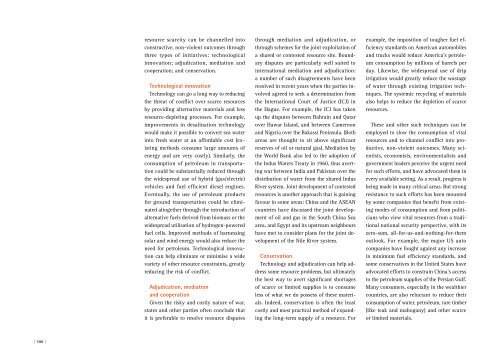RESOURCE COMPETITION IN THE 21ST CENTURY
RESOURCE COMPETITION IN THE 21ST CENTURY
RESOURCE COMPETITION IN THE 21ST CENTURY
You also want an ePaper? Increase the reach of your titles
YUMPU automatically turns print PDFs into web optimized ePapers that Google loves.
esource scarcity can be channelled intoconstructive, non-violent outcomes throughthree types of initiatives: technologicalinnovation; adjudication, mediation andcooperation; and conservation.Technological innovationTechnology can go a long way to reducingthe threat of conflict over scarce resourcesby providing alternative materials and lessresource-depleting processes. For example,improvements in desalination technologywould make it possible to convert sea waterinto fresh water at an affordable cost (existingmethods consume large amounts ofenergy and are very costly). Similarly, theconsumption of petroleum in transportationcould be substantially reduced throughthe widespread use of hybrid (gas/electric)vehicles and fuel efficient diesel engines.Eventually, the use of petroleum productsfor ground transportation could be eliminatedaltogether through the introduction ofalternative fuels derived from biomass or thewidespread utilisation of hydrogen-poweredfuel cells. Improved methods of harnessingsolar and wind energy would also reduce theneed for petroleum. Technological innovationcan help eliminate or minimise a widevariety of other resource constraints, greatlyreducing the risk of conflict.Adjudication, mediationand cooperationGiven the risky and costly nature of war,states and other parties often conclude thatit is preferable to resolve resource disputesthrough mediation and adjudication, orthrough schemes for the joint exploitation ofa shared or contested resource site. Boundarydisputes are particularly well suited tointernational mediation and adjudication:a number of such disagreements have beenresolved in recent years when the parties involvedagreed to seek a determination fromthe International Court of Justice (ICJ) inthe Hague. For example, the ICJ has takenup the disputes between Bahrain and Qatarover Hawar Island, and between Cameroonand Nigeria over the Bakassi Peninsula. (Bothareas are thought to sit above significantreserves of oil or natural gas). Mediation bythe World Bank also led to the adoption ofthe Indus Waters Treaty in 1960, thus avertingwar between India and Pakistan over thedistribution of water from the shared IndusRiver system. Joint development of contestedresources is another approach that is gainingfavour in some areas: China and the ASEANcountries have discussed the joint developmentof oil and gas in the South China Seaarea, and Egypt and its upstream neighbourshave met to consider plans for the joint developmentof the Nile River system.ConservationTechnology and adjudication can help addresssome resource problems, but ultimatelythe best way to avert significant shortagesof scarce or limited supplies is to consumeless of what we do possess of these materials.Indeed, conservation is often the leastcostly and most practical method of expandingthe long-term supply of a resource. Forexample, the imposition of tougher fuel efficiencystandards on American automobilesand trucks would reduce America’s petroleumconsumption by millions of barrels perday. Likewise, the widespread use of dripirrigation would greatly reduce the wastageof water through existing irrigation techniques.The systemic recycling of materialsalso helps to reduce the depletion of scarceresources.These and other such techniques can beemployed to slow the consumption of vitalresources and to channel conflict into productive,non-violent outcomes. Many scientists,economists, environmentalists andgovernment leaders perceive the urgent needfor such efforts, and have advocated them inevery available setting. As a result, progress isbeing made in many critical areas. But strongresistance to such efforts has been mountedby some companies that benefit from existingmodes of consumption and from politicianswho view vital resources from a traditionalnational security perspective, with itszero-sum, all-for-us-and-nothing-for-themoutlook. For example, the major US autocompanies have fought against any increasein minimum fuel efficiency standards, andsome conservatives in the United States haveadvocated efforts to constrain China’s accessto the petroleum supplies of the Persian Gulf.Many consumers, especially in the wealthiercountries, are also reluctant to reduce theirconsumption of water, petroleum, rare timber(like teak and mahogany) and other scarceor limited materials.[ 300 ]
















